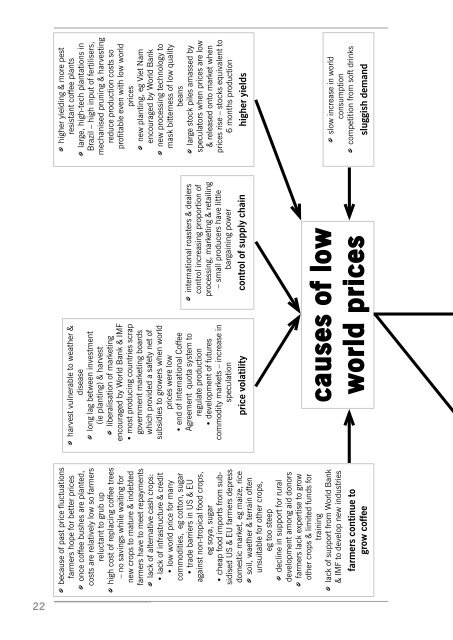Cost of coffee.indd - RISC
Cost of coffee.indd - RISC
Cost of coffee.indd - RISC
You also want an ePaper? Increase the reach of your titles
YUMPU automatically turns print PDFs into web optimized ePapers that Google loves.
• because <strong>of</strong> past price fluctuations<br />
farmers hope for better prices<br />
• once c<strong>of</strong>fee bushes are planted,<br />
costs are relatively low so farmers<br />
reluctant to grub up<br />
• high cost <strong>of</strong> replacing c<strong>of</strong>fee trees<br />
– no savings while waiting for<br />
new crops to mature & indebted<br />
farmers have to meet repayments<br />
• lack <strong>of</strong> alternative cash crops:<br />
• lack <strong>of</strong> infrastructure & credit<br />
• low world price for many<br />
commodities, eg cotton, sugar<br />
• trade barriers in US & EU<br />
against non-tropical food crops,<br />
eg soya, sugar<br />
• cheap food imports from subsidised<br />
US & EU farmers depress<br />
domestic market, eg maize, rice<br />
• soil, waether & terrain <strong>of</strong>ten<br />
unsuitable for other crops,<br />
eg too steep<br />
• decline in support for rural<br />
development among aid donors<br />
• farmers lack expertise to grow<br />
other crops & limited funds for<br />
training<br />
• lack <strong>of</strong> support from World Bank<br />
& IMF to develop new industries<br />
farmers continue to<br />
grow c<strong>of</strong>fee<br />
• harvest vulnerable to weather &<br />
disease<br />
• long lag between investment<br />
(ie planting) & harvest<br />
• liberalisation <strong>of</strong> marketing<br />
encouraged by World Bank & IMF<br />
• most producing countries scrap<br />
government marketing boards<br />
which provided a safety net <strong>of</strong><br />
subsidies to growers when world<br />
prices were low<br />
• end <strong>of</strong> International C<strong>of</strong>fee<br />
Agreement quota system to<br />
regulate production<br />
• development <strong>of</strong> futures<br />
commodity markets – increase in<br />
speculation<br />
price volatility<br />
• international roasters & dealers<br />
control increasing proportion <strong>of</strong><br />
processing, marketing & retailing<br />
– small producers have little<br />
bargaining power<br />
control <strong>of</strong> supply chain<br />
causes <strong>of</strong> low<br />
world prices<br />
• higher yielding & more pest<br />
resistant c<strong>of</strong>fee plants<br />
• large, high-tech plantations in<br />
Brazil – high input <strong>of</strong> fertilisers,<br />
mechanised pruning & harvesting<br />
reduce production costs so<br />
pr<strong>of</strong>itable even with low world<br />
prices<br />
• new planting, eg Viet Nam<br />
encouraged by World Bank<br />
• new processing technology to<br />
mask bitterness <strong>of</strong> low quality<br />
beans<br />
• large stock piles amassed by<br />
speculators when prices are low<br />
& released onto market when<br />
prices rise – stocks equivalent to<br />
6 months production<br />
higher yields<br />
• slow increase in world<br />
consumption<br />
• competition from s<strong>of</strong>t drinks<br />
sluggish demand<br />
22




